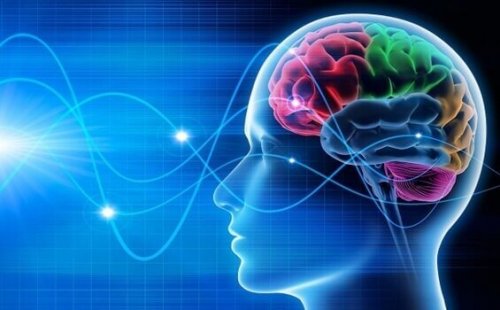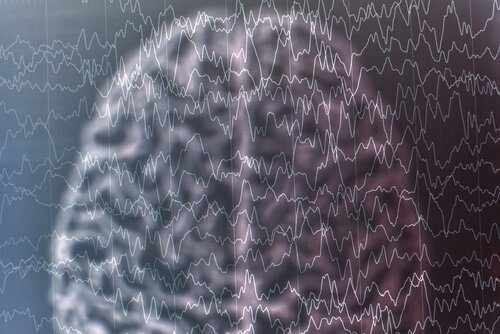What Scientists Know about Mysterious Delta Waves

Brain delta waves are mysterious and fascinating. Grey Walter discovered they existed back in the early 20th century. These waves have a frequency that ranges between 0 and 4 Hz and they’re the slowest of all brain waves. Also, they’re associated with well-being and inner peace.
Scientists still don’t know much about delta waves. These waves are incredibly curious, precisely because they’re present in states of extreme calmness. However, experts know little to nothing about how they work.
“Neuroscience is by far the most exciting branch of science because the brain is the most fascinating object in the universe. Every human brain is different – the brain makes each human unique and defines who he or she is.”
-Stanley B. Prusiner, Nobel Prize in Medicine, 1997-

Deep Relaxation
All the data available to date suggests that delta waves have little to do with consciousness, meaning that they’re never present during conscious states. At first, they manifest in the deepest sleep stages, which are those in which you’re not yet dreaming.
Research has revealed that these brain waves are present in deep meditation states as well. Through lab monitoring, it’s clear that deep relaxation states make these waves emerge.
Furthermore, it’s surprising that these are the predominant brain waves in a fetus inside the uterus. They’re present until a baby turns one. Scientists speculate that this is the result of a brain mechanism that helps the newborn stay calm amid environmental stimuli.
The Effects of Delta Waves
To date, some studies have demonstrated that delta waves are closely related to the deepest calm states. However, that’s not their only effect.
There’s evidence to support that they also affect other processes, such as:
- Good sleep. If you don’t get to the deep sleep stage, which is the stage in which these waves appear, you’ll probably feel tired when you wake up.
- Basic body functioning. If there’s a day in which your body doesn’t produce delta waves, it may affect some bodily functions such as breathing and heart rate.
- The intuitive process. It seems that these waves are related to the decision-making process.
- Motivation and empathy. Experts claim that when the brain produces delta waves frequently, the individual tends to be more open-minded and empathetic. Their motivation also increases.
Other Findings
The American Headache Society has published several studies on the topic. In some of them, experts refer to the fact that the production of delta brain waves is an important factor when it comes to migraines. Seemingly, the more your brain produces delta waves, the less likely you are to suffer from migraines.
Also, another study by Wanee Rojviroj found a strong link between brain waves and stress. In this particular study, Rojviroj concludes that delta waves induce relaxation. That’s why scientists suspect these waves play a role in serotonin and melatonin release. This, however, hasn’t yet been proven.

The natural way of getting your brain to produce delta waves is deep sleep. That’s why psychology always highlights the importance of sleep hygiene. Another way of producing these waves is through meditation techniques.
Brain delta waves are mysterious and fascinating. Grey Walter discovered they existed back in the early 20th century. These waves have a frequency that ranges between 0 and 4 Hz and they’re the slowest of all brain waves. Also, they’re associated with well-being and inner peace.
Scientists still don’t know much about delta waves. These waves are incredibly curious, precisely because they’re present in states of extreme calmness. However, experts know little to nothing about how they work.
“Neuroscience is by far the most exciting branch of science because the brain is the most fascinating object in the universe. Every human brain is different – the brain makes each human unique and defines who he or she is.”
-Stanley B. Prusiner, Nobel Prize in Medicine, 1997-

Deep Relaxation
All the data available to date suggests that delta waves have little to do with consciousness, meaning that they’re never present during conscious states. At first, they manifest in the deepest sleep stages, which are those in which you’re not yet dreaming.
Research has revealed that these brain waves are present in deep meditation states as well. Through lab monitoring, it’s clear that deep relaxation states make these waves emerge.
Furthermore, it’s surprising that these are the predominant brain waves in a fetus inside the uterus. They’re present until a baby turns one. Scientists speculate that this is the result of a brain mechanism that helps the newborn stay calm amid environmental stimuli.
The Effects of Delta Waves
To date, some studies have demonstrated that delta waves are closely related to the deepest calm states. However, that’s not their only effect.
There’s evidence to support that they also affect other processes, such as:
- Good sleep. If you don’t get to the deep sleep stage, which is the stage in which these waves appear, you’ll probably feel tired when you wake up.
- Basic body functioning. If there’s a day in which your body doesn’t produce delta waves, it may affect some bodily functions such as breathing and heart rate.
- The intuitive process. It seems that these waves are related to the decision-making process.
- Motivation and empathy. Experts claim that when the brain produces delta waves frequently, the individual tends to be more open-minded and empathetic. Their motivation also increases.
Other Findings
The American Headache Society has published several studies on the topic. In some of them, experts refer to the fact that the production of delta brain waves is an important factor when it comes to migraines. Seemingly, the more your brain produces delta waves, the less likely you are to suffer from migraines.
Also, another study by Wanee Rojviroj found a strong link between brain waves and stress. In this particular study, Rojviroj concludes that delta waves induce relaxation. That’s why scientists suspect these waves play a role in serotonin and melatonin release. This, however, hasn’t yet been proven.

The natural way of getting your brain to produce delta waves is deep sleep. That’s why psychology always highlights the importance of sleep hygiene. Another way of producing these waves is through meditation techniques.
All cited sources were thoroughly reviewed by our team to ensure their quality, reliability, currency, and validity. The bibliography of this article was considered reliable and of academic or scientific accuracy.
Rodríguez Sánchez, P. M., & Rodríguez Rodríguez, M. (2011). Argumentación de la teoría científica: modo de funcionamiento subconsciente del cerebro en estado hipnótico. Medisan, 15(7), 975-991.
This text is provided for informational purposes only and does not replace consultation with a professional. If in doubt, consult your specialist.







